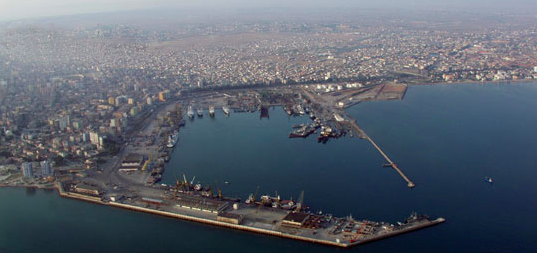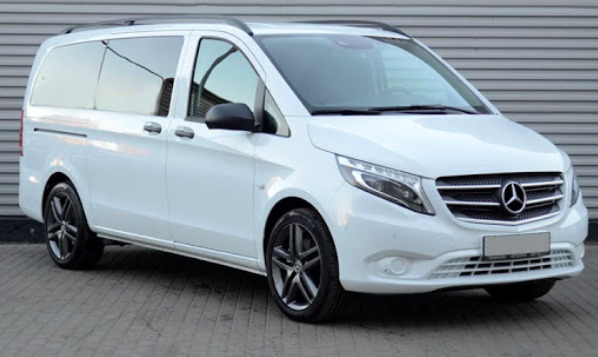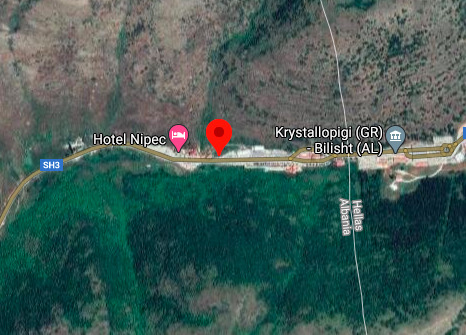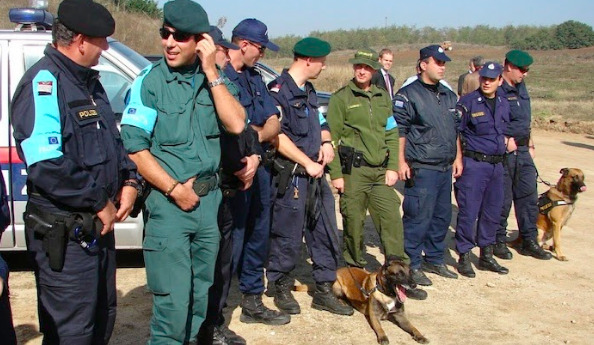This is one out of four BVMN reports that describe a pushback from the port city of Durrës in Albania to Greece on the 5th of February 2021 (1,2,3). There have been multiple BVMN reports on pushbacks from Durrës since January 2021. All follow a similar pattern. More information about these mass expulsions can be found in the BVMN February Report.

The respondent is a 19-year-old man. He was pushed back from Albania to Greece for the first time on the 5th of February and a second time reportedly a few days later on the 8th of February 2021.
The respondent broke his leg in an accident on the 31st of January 2021 and was bed-bound in a hotel in Durrës for five days, where he had already been staying for two weeks.
He did not know the name of the hotel but believed it to be a four-storey building. The description of the hotel corresponds with earlier BVMN reports in which the hotel is said to be located here.
He called the owner legraa (bald in Algerian Arabic dialect) and added:
“I feel like he knew the police is coming but didn’t inform us.”
The respondent also stated that he was aware of regular police raids at the hotel.
“I heard that they came multiple times.”
Due to his broken leg, the respondent did not think he would be pushed back.
“[I] had the paper from the hospital that means [I’m] a disabled person and [I] had an x-ray and [I] had crutches. And that didn’t stop them to push [me] back.”
On the 5th of February, the police knocked on the door of the hotel room. The respondent shared a room with three Algerian men. It was around 6 AM After knocking once, the officers forcefully opened the door with a screwdriver.
“Three Moroccans were left in the snow, [we] heard about them, when [we] heard the knocking [we] directly thought about [what had happened] to them in the snow. [We] were afraid to open the door and be in the snow. [We] knew they would push [us] back.”
Various testimonies reported to the BVMN have mentioned the death of three Moroccan men who tried to cross the Albanian mountains. No official public statement by the Albanian authorities has been made.
Then, four male police officers entered the room and slapped the three men in their faces once. The respondent described them as ‘really huge guys’ wearing black uniforms and red armbands. ‘Police’ was written in Albanian on their uniforms. They were wearing covid-19 face masks.
The respondent asserted that around 15 male police officers in total came to the hotel. All wore dark blue uniforms with red armbands, balaclavas or covid-19 face masks. According to the respondent, approximately 50 people on the move (POM) staying in the hotel were arrested and brought to the same police station. They were all male and from Morocco, Algeria and Egypt.
Outside the hotel, the respondent saw five white vehicles with ‘police’ in Albanian in blue written on them. They were Mercedes Vitos. All vehicles had Albanian number plates. The respondent was put in a van with seven other POM. Three police officers were with them. The five vehicles left the hotel together and drove to a police station in the port of Durrës.

According to the respondent, the drive lasted around eight minutes. There, the men had to wait in a ‘green space’ in front of the police station together with other POM who had been arrested all over the city. In total, 60 men were held in custody in the front yard of the police station.
“Not only from the hotel, there are some people from the streets, from the squats.”
The respondent spoke to various people and discovered where they had been arrested. The testimony of an Algerian man arrested in the streets of Durrës can be found here.
Besides the 15 police officers that evicted the people in the hotel, 12 more officers were in front of the police station. Six of them were in civilian clothing and the other six were in police uniforms, as recounted by the respondent. The 27 police officers were surrounding the detainees in the front yard.
The respondent described how some of the men, who had experienced a pushback from Albania before, began to self-harm.
“They had knives and start stabbing themselves. Then the violence started. The blood was everywhere. It was so sad. I cannot even think about it now because so many people were stabbing themselves.”
The respondent recalled that to suppress this action, 20 Albanian police officers in dark blue uniforms on 10 motorcycles arrived at the scene and began to beat the people with batons. The description of this incident corresponds with another BVMN report of the same date. Then, three POM were taken inside the police station where the beatings with batons continued. Afterwards, they were brought back outside.
“I saw the traces of the batons in their backs.”
The respondent was not beaten. He reported how another man fainted and fell to the ground. An ambulance arrived one and a half hours later.
“One police officer there, he was just checking his heart if he was dead or not.”
Afterwards, the police took each person’s fingerprint and photograph in a building close to the police station. The officers used the same vans from before. The drive lasted around five minutes. The respondent asserted how the place was still part of the police station.
“It was still in the port.”
This procedure correlates with another BVMN report in which the respondent described how he was brought to a different building in the port to get his fingerprints taken. The respondent was returned to the front yard of the police station afterwards.
He received food, water and had access to the toilet.
“A van came and they gave us food and water inside the plastic bags. The plastic bag was white and the flag of the European Union [on] it.”
The police officers handed over the food. The people that brought the food waited further away. The respondent only saw the driver, a man, standing next to the van in the distance. For this reason, he could not describe the people in more detail.
At around 4 PM, a blue coach arrived to drive the people to the Greek-Albanian border area.
“It’s not like police busses.”
Before all 60 people were placed on the bus, the police confiscated their phones and put them in a plastic bag. The phones were returned later when they arrived in the border area. Two police officers and one driver were on the bus. Five police cars and vans escorted the bus to the border area. The respondent could not count how many police officers were in each vehicle. They drove for around four hours without any breaks. At 9 PM, the bus stopped on a ‘small road inside the woods.’
Together with the police officers, the group walked to the border with Greece. They walked along a small road with cars driving past. Some men were handcuffed. The respondent was not. After around one hour of walking at 10 PM, they reached the border and the officers returned to Albania.
“They put [us] exactly in the border and left. They said nothing.”
The 250 km long frontier between Albania and Greece lacks fencing and clear demarcation, unlike Greece’s borders with North Macedonia and Turkey.
In Greece, the respondent made a fire and slept outside together with a 22-year-old Moroccan man. The ground was covered with snow. The next morning, the respondent and the Moroccan man returned to Albania where they were arrested for a second time. Who arrested them was not detailed by the respondent.
“[We] tried again and they pushed [us] back.”
Based on the testimony of an Algerian man who encountered a young man with crutches and ‘his friend’ in a police car after being arrested on the 8th of February, 15km away from Korçë, it can be assumed that it was the respondent and the Moroccan man.
Both respondents reported how they were then brought to a ‘small camp,’ a few hundred metres away from the official border crossing with Greece.

At the camp, when the respondent got out of the car, a police officer threw his crutches on the floor. He had to get there and pick them up himself afterwards. The respondent recounted seeing containers, a small restaurant, doctor equipment and shower facilities in the camp.
“All of these things are new and no one used them. When I asked [my] friend like the old one who tried so many times [to cross the border] they said like we never used these things, they never gave us food from here or we never used the shower or a doctor.”
The respondent saw around 25 police officers from Albania, Poland, Hungary and Germany in the camp. He could identify officers from Hungary because of the number plates on the cars.
“Hungary H and [I] saw it from the plate number.”
He described the uniforms as ‘different from one country to another.’ The uniforms were green, blue and black. Some officers had little flags on the sleeves of their uniforms as the respondent recalled.
“I saw one police officer with the German flag.”

He asserted seeing the car brands Skoda, Range Rover and a Volkswagen van. The respondent pointed out that all cars were new. Some vehicles were grey with blue writings on them, including the flag of the country on the engine cover. He could not see what the writing said.
In July 2020, BVMN documented the presence of German and Polish Frontex officers on the Greek-Albanian border. Frontex launched its first operation in Albania in 2019. A BVMN January testimony gave a very similar description of Frontex officers and the use of vehicles.
The respondent believed that all POM who are apprehended in the border area are brought to the camp and held captive for a short time to get their fingerprints taken before being pushed back to Greece. This procedure had also been documented in another BVMN Albanian pushback report. In the camp, the officers ascertained that the respondent had already given his fingerprints in Durrës. He was then asked by one police officer if he wanted to apply for asylum which the respondent affirmed. The officer then took pictures of his face from different angles.
“I did asylum because I’m vulnerable and I couldn’t walk in the snow and I thought they gonna give me a paper and I would stay here until I will leave at some point but they didn’t.”
From the camp, the respondent and the Moroccan man were pushed back to Greece. Seven Albanian police officers brought them there. They walked for an hour. Who else was pushed back with them is unknown.
“It was really hard for me and he said I was walking the whole day. It was so hard for me to walk.”
Once in Greece, the respondent walked to Kastoria for 12 hours along with his friend. In Kastoria, they bought two bus tickets to Thessaloniki.
